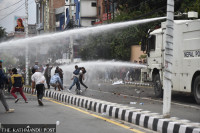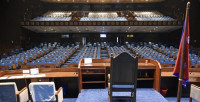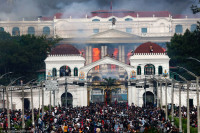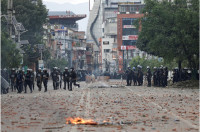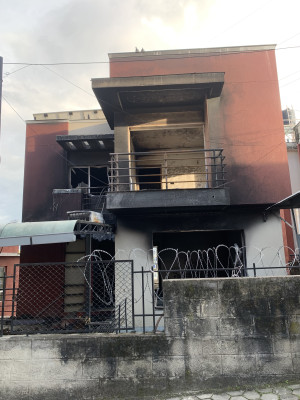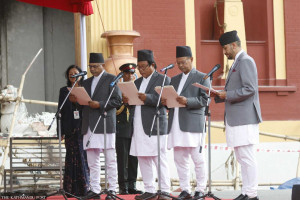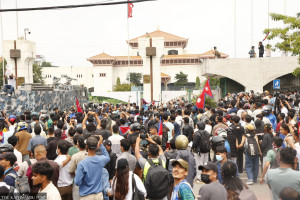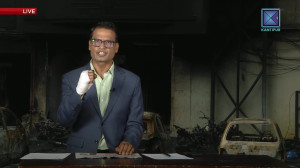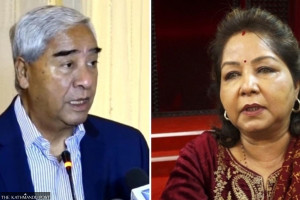Columns
Is Nepali politics in trouble?
Before declaring the end of this system, we must consider the positive aspects of its origin and continuity.
Abhi Subedi
Ambivalent discourses about Nepali political parties are emanating from various sources. More emerge in news portals and ideas published in the columns. Some appear as cogent analysis and others as jeremiads, mere lamentations about the existence of political parties and their perennial failures, which I brand as extremist views.
We see the expressive dimension of politics—its modes, methods and existence through language. For that, I often refer to George Orwell and BP Koirala with the students of literature and language. Orwell directly hits the politicians’ misuse of language in his essay “Politics and the English Language”. BP uses the language of literature to show that literature is his anarchist exercise while keeping his socialist politics as something unrelated to that. I have tried to deconstruct BP’s binary between literature and politics in my previous writings.
Some interviewers of interdisciplinary studies asked me to name the sources of my reading about Nepali politics and history. I was expected to be confessional and brief. By using a line from the Beatles’ song, I replied, “I get by with a little help” from the writings of academicians, including Rishikesh Shah, Lok Raj Baral, Krishna Khanal, Krishna Hachethu, Hari Roka, Mahesh Regmi, Mahesh Raj Panta, John Whelpton, Triratna Manandhar and Pratyoush Onta among others. Apart from them, I also refer to Nepali Communist Andolan ra Janakrantika Aitihasik Dastabejharu given to me for review by Lokendra Bista, the erstwhile Maoist guerrilla “turned farmer”, and Purushottam Basnet’s volumes of the history of Nepali Congress. It is a very confessional and short reading list.
I evoke these writings whenever I have to interpret Nepali political-historical subjects, if not literary ones. When people’s writings and emotional outbursts about what is being interpreted as the crisis of the Nepali party system challenged me, I turned to some interpretations published in newspapers to begin with.
Historians and political analysts have ambivalent relationships with the political parties, as they rely on them to write on the subject. They need KP Sharma Oli’s playfully acted-out noise game about coalitions and alliances; Pushpa Kamal Dahal’s desperate noise that he fought for the nation’s secure future; Sher Bahadur Deuba’s not so distinct democratic political injunctions given to his fellow party members; and Baburam Bhattarai’s occasional hermit-like pronouncements about the future course of politics. They need to picture the Sisyphus-like Rabi Lamichhane’s ceaseless repetition of pushing the boulder up the hill and rolling it down; Upendra Yadav’s occasional and very personalised confessions; and the Rastriya Swotantra Party’s talented women leaders’ search for meaning. The list goes on.
Moreover, historians and political analysts need to know how the political parties plan their actions in Parliament, in the streets, at the minuscule rallies and factional meetings. They need to show how the political leaders, elected union members and provinces play the power kabaddi game. They need to describe how my students (I tend to take all students as mine because of my long years of teaching) perform the wee dramas of padlocking the lonely gates and doors of the universities.
Interpretations and performance are two main elements of theatre. We try to bring them together on stage. In the context of the Nepali political parties and their so-called problematic performances, we have to confront an absurd reality. We can double down our criticism of them, but only with a certain caveat. We should be able to answer this question: In this case, do you want to abolish the political party system of government? The answer is: “No, we don’t.” But one interpretation can be ventured. If the parties do not function, an alternative could automatically emerge. But will that alternative be a form of dictatorship in our case? As warned by politicians like Bernie Sanders, the rise of oligarchy will haunt the most hallowed democratic political systems of the world.
Professor and guru of Nepali political scholars Lok Raj Baral says, “Generally, people see parties in liberal democracies with disdain due to manipulation by a small group of elites with dubious distinction.” That is an oligarchy in semantic form. To Baral, “that is goaded by non-political dealers such as business tycoons, the mafia and ‘bichauliyaʼ (middlemen).” He wonders if the political parties are relevant today. (The Kathmandu Post, January 27, 2025).
How do we answer that question of relevancy? This is an existential question. It is important to discuss political angst related to the political system. Various Nepali politicians bandy about this theme. But the point is that we cannot think about the alternative. All the big democratic countries of the world may not be functioning as cogently and efficiently as the British democratic system, to take one important example, but they are functioning. My position is that before pronouncing the apocalyptic end of this system, we should look at the positive modes of its origin and continuity.
I recall one occasion at the SAARC literary writers’ meeting in Delhi several years ago. In a discussion after one writer’s little political-oriented presentation, Indian scholar and professor Ashish Nandy made a brief remark. I was sitting next to him. He was given just a few minutes to put in his observation. Nandy said, “We should send the names of Pakistan and Nepal to the Guinness Book of World Records—Pakistan for the political parties maintaining the continuity of the party system, and Nepal for establishing a federal democratic republic after 19 days of huge uprising.” I admired his observation. The achievement is functioning here, and we must not forget it.
But vigilance and the spirit of awakening need to be maintained. The political problems are becoming more complex because of national and international developments. Challenges have multiplied due to the failures of the political parties and their leaders to work to institutionalise the system. Sometimes, I feel that the leaders in the leading and policy-making roles do not have sufficient academic exposure to understand the power of a democratic system and chart a course. It is not expected of every other member of the federal and provincial parliaments. We should see what is functioning and what is not. I would like to use the term “negative capability” that critics use, bringing it from the poetry of British poet John Keats of the 19th century. Negative capability is the power to be in difficult situations and function. We and the world need that capability for survival and continuity.




 17.62°C Kathmandu
17.62°C Kathmandu
